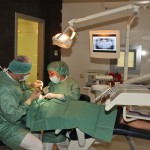
Smoking is a risk factor for periodontal disease and periodontal surgery is often required to bring about improvements in probing depth (PD). Studies have suggested poorer outcomes from periodontal treatment in smokers. The aim of this review is to assess the impact of cigarette smoking on the clinical outcomes following periodontal surgery procedures (flap debridement surgery, modified Widman flap, apically positioned flap).
Methods
Searches were conducted in the Cochrane Central Register of Controlled Trials (CENTRAL), Medline and Embase databases. This was supplemented by hand searches of the journals; Journal of Clinical Periodontology, Journal of Periodontology, The International Journal of Periodontics & Restorative Dentistry, and Journal of Periodontal Research. Controlled studies with more than 10 patients comparing surgical interventions that included flap debridement surgery, modified Widman flap, and apically positioned flap procedures in smokers and non-smokers with 6 months or longer follow up were considered.
Two reviewers independently screened the studies, extracted data and carried out quality assessment. Study quality was assessed using the Consolidated Standards of Reporting Trials (CONSORT) statement criteria Meta-analyses were conducted separately for each of the two primary outcomes, probing depth (PD) and clinical attachment level (CAL) using a random-effects model.
Results
- 8 studies involving a total of 363 patients were included.
- 3 were considered to have a low risk of bias, 2 a moderate risk and 3 a high risk.
- All 8 studies reported on PD but only 4 on CAL.
- All studies reported a significantly less reduction in PD among smokers compared with non-smokers.
- All studies reported greater CAL gain in non-smokers compared with smokers but also consistently noted a mean gain in post-surgical CAL for smokers.
- Meta-analysis (8 studies) found an increased reduction in mean PD = 0.39 (95% CI; 0.33 to 0.45) mm.
- Meta-analysis (4 studies) found a mean gain in CAL = 0.35 (95% CI; 0.30 to 0.40) mm.
Conclusions
The authors concluded: –
Overall, periodontal surgical treatment benefited patients irrespective of smoking status. However, the magnitude of the therapeutic effect was significantly more beneficial in non-smokers compared with smokers in terms of both PD and CAL. Clinicians should use findings of the present study during preoperative treatment planning to caution smokers about the potential need for further therapeutic interventions following periodontal flap surgery.
Comments
Only a small number of small studies were included in this review and only 3 of these were considered to be at low risk of bias. All the included studies reported a greater benefit for non-smokers over smokers for both PD and CAL with the meta-analysis quantifying that as a statistically significant effect on PD on 0.39mm and CAL of 0.35mm. While there was little heterogeneity between the studies the authors did highlight a lack of standardised reporting of smoking status within the studies.
Links
Kotsakis GA, Javed F, Hinrichs JE, Karoussis IK, Romanos GE. Impact of cigarette smoking on clinical outcomes of periodontal flap surgical procedures: a systematic review and meta-analysis. J Periodontol. 2015 Feb;86(2):254-63. doi: 10.1902/jop.2014.140452. Epub 2014 Oct 9. PubMed PMID: 25299388.

Better outcomes from periodontal surgery in non-smokers. http://t.co/ixlVG6hkPx
Smokers have poorer outcomes from periodontal surgery. http://t.co/ixlVG6hkPx
Non-smokers have been outcomes from periodontal surgery. http://t.co/ixlVG6hkPx
Smokers have less favourable outcomes from periodontal surgery. http://t.co/ixlVG6hkPx
Don’t miss – Periodontal surgery: less favourable outcomes in smokers. http://t.co/ixlVG6hkPx
Periodontal surgery: less favourable outcomes in smokers https://t.co/Mb3RjzbhKp via @sharethis